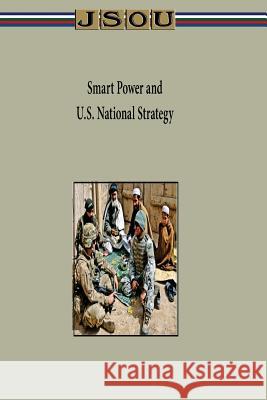Smart Power and U.S. National Strategy » książka
Smart Power and U.S. National Strategy
ISBN-13: 9781503205864 / Angielski / Miękka / 2014 / 128 str.
The dissolution of the Union of Soviet Socialist Republics (USSR) in 1991 generated a hopeful mood throughout the Western world as the Cold War ended, leaving the United States as the sole superpower. The unipolar era that followed did not bring lasting peace, however, but global uncertainty and persistent conflict. In a short period of time, the mood in the "lonely superpower" faded in the face of the terrorist attacks on 11 September 2001, the wars that followed in Afghanistan and Iraq, and the deepest global economic crisis since the 1930s global depression. The U.S. and its allies currently face daunting challenges and threats including violent extremists, cyber war, nuclear proliferation, nuclear terrorism, integrated terrorist networks and transnational criminal organizations, failed or failing states, a resurgent authoritarian Russia, humanitarian crises, China's rise, and the "rise of the rest." In this increasingly complex global security environment, the concept of national security itself is said to comprise a myriad of components such as energy, information systems, demographic and climatic restiveness, mineral resources, food, water, and sociopolitical disorders associated with globalization and issues of governance. As the United States reduced its military footprint in Iraq and U.S.-North Atlantic Treaty Organization (NATO) operations continued in Afghanistan, the demographically driven turmoil of the "Arab Spring" spread along the "arc of instability" spanning from North Africa across the Middle East to the Indian Ocean. In these conflict areas, Special Operations Forces (SOF), with their innate capabilities, skill sets, and a force structure exceptionally suited to engage the diverse, networked, technologically savvy, asymmetric adversaries, have been at the tip of the spear.
Zawartość książki może nie spełniać oczekiwań – reklamacje nie obejmują treści, która mogła nie być redakcyjnie ani merytorycznie opracowana.











